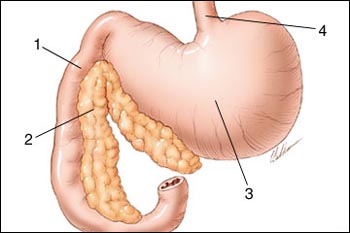Understanding and Successfully Treating Pancreatitis in Dogs
A dog’s pancreas is responsible for two main functions; aiding in the metabolism of sugar in the body through the production of insulin, and producing the enzymes that digest food.
Acute pancreatitis is a sudden onset of pancreatic inflammation. When this condition occurs, the flow of enzymes into the digestive tract can become disrupted, forcing the enzymes out of the pancreas and into the abdominal area.
If not treated quickly, damage to other organs will quickly follow. The digestive enzymes will begin to break down fat and proteins in the pancreas as well as other surrounding organs, effectively digesting itself. The kidney and liver can also be affected when this progression takes place, and the abdomen will often become inflamed and possibly infected. If bleeding occurs in the pancreas, shock and death can occur.
 Temporary pancreatic conditions can arise after eating a large amount of fatty foods or table scraps, commonly seen around the holidays.
Temporary pancreatic conditions can arise after eating a large amount of fatty foods or table scraps, commonly seen around the holidays.
Main Causes for Pancreatitis in Dogs
In recent years there’s been a rise in many types of disease in dogs, including pancreatitis and pancreatic cancer in dogs. There are several causes for these pancreatic conditions, some of them are nutritional factors, such as high levels of fat in the blood (lipemia), high levels of calcium in the blood (hypercalcemia), trauma to the pancreas, drugs or toxins and long term dietary issues.
Improper diet is thought to be a common factor in canine pancreatitis. Diets high in fat content have been associated with the disease. An increase in pancreatic conditions occurs around the holidays due to large amounts of table scraps being given, which are not part of their usual diet. Processed diet are not only a challenge to the overall immune system, but they also directly affect the digestive tract and its ability to flush out contaminants. This is especially true with dry dog foods, as they often contain toxins and carcinogens and dehydrate the digestive tract resulting in malfunctioning digestive tract.
The pancreas helps in producing some enzymes to break down certain types of foods, however a canine naturally has a low enzyme production as well as the inability to produce certain types of enzymes that break down certain types of plant material. Unfortunately, many processed foods contain cheap fillers of corn and grains, which is not part of a species appropriate diet for canines. This challenges the dog’s digestive tract and causes complications which digestions and stresses organs such as the kidney and liver.
A rare cause, can be that of a certain scorpion sting, in which the venom can cause the pancreas to react and lead to inflammation.
 Dry dog foods actually dehydrate the digestive tract and fail to properly flush out contaminants and pollutants from the intestines and and liver.
Dry dog foods actually dehydrate the digestive tract and fail to properly flush out contaminants and pollutants from the intestines and and liver.
Diagnosing Pancreatitis in Dogs
To accurately diagnose pancreatitis, other causes of the symptoms must be ruled out. A complete a complete blood count, urinalysis and a thorough physical exam is generally performed. Insulin and enzyme levels will be measured to assess the situation. If further tests are needed then (x-rays) or an ultrasound can also help in making the diagnosis. If there’s still challenge with the diagnosis, then a biopsy can result in a conclusive diagnosis.
Prognosis for dogs with Pancreatitis?
Pancreatitis can be a very unpredictable and go from mild concerns to a serious condition. If the pancreatitis was mild and only a single episode, then dietary adjustments may serve prevent the recurrence. If pancreatitis reoccurs, then it can be more severe than the first episode and be more challenging to treat.
Some dogs may develop chronic pancreatitis, which can lead to diabetes mellitus and/or pancreatic insufficiency.
Canine Pancreatitis Symptoms:
- Fever
- Vomiting
- Diarrhea
- Loss of appetite
- Weight loss (more common in cats)
- Fatigue and sluggishness
- Mild to severe abdominal pain (may become more sever after eating)
- Depression
- Difficulty breathing

Pancreatic cancer in dogs tends to spread very quickly and often reaches advanced stages before symptoms appear. This makes it extremely difficult to treat and the prognosis is often poor.
Surgery is the common protocol, however it’s common that other organs are affected by the time of the diagnosis. It’s also extremely difficult to remove all the cancerous tissue and tumor often grow back.
- If there is inflammation of the pancreas or adjacent bile ducts of the liver, antibiotics or anti-inflammatory drugs may be helpful.
- There is no satisfactory treatment to treat cancer of the exocrine pancreas. Diagnosis is usually too late for successful surgery and chemotherapy is usually contra-indicated because the cancers are too painful.
- Benign endocrine cancers can be removed surgically but multiple or malignant ones are not surgically treatable.
- Medical drugs to control blood sugar are often prescribed.
- Prednisolone is a steroid that stimulates formation of glucose and is often a cornerstone of medical treatment.
Is it a Case of Faulty Genes?
In the vast majority of cases, absolutely not. Some types of cancer are more common it certain breeds, as they may be more predisposed. However, it’s important to understand that predisposed does not mean predetermined! Genetics are a factor, but there are many other factors as well.
For cancer, or any disease to develop, a dysfunction in the immune system must be present. So by addressing this area, we can greatly reduce illness regardless of what genetic challenges a certain breed has.
All that being said, when a breed is more predisposed, this simply means that when something is challenging the immune system, this is the weakest link and often the first place that we see the effects.
Many dogs have these same “weak links” and go on to live a healthy full lives, while some unfortunately do not. Genes are merely blueprints, and it’s how well these these blueprints are properly built upon and maintained that makes the difference.
External factors such as dietary complications and toxins are a main factor in affecting the digestive tract and immune system, which are directly linked. This intern, allows for the cells to be altered and cancer to develop.



